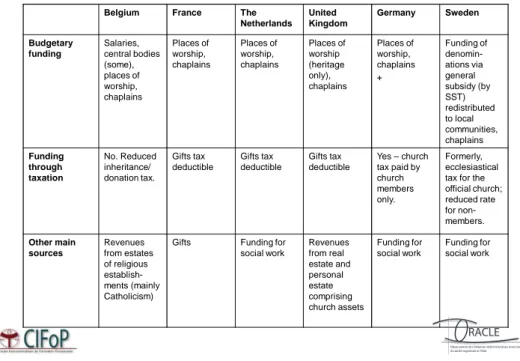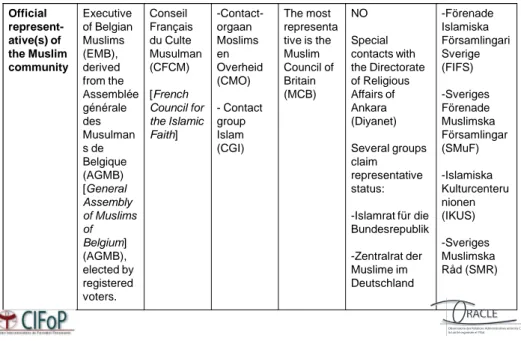EPC – KBF DIALOGUE
The Status of Imams in Europe
Wednesday 29 June 2005
The training of the imams :
the search for information useful for reflexion
Research carried out for the King Baudouin Fondation by :
Jean-François Husson,
ORACLE Coordinator, Secretary General of the CIFoP, with the collaboration of
Julie Dury,
Scientific Adviser at the CIFoP Centre Interuniversitaire
de Formation permanente
[Inter-university Centre for
Continuing Education]
Non profit-making organization
Observatoire des Relations Administratives entre les Cultes, la Laïcité organisée et l’Etat
[Watchdog for Administrative Relations between Religious Groups, Organized Secularism and the
1. General overview
• Churches and State relations
• Public funding of religious groups
• Presence of Islam
– Size
– Representation
Table 1. Relations between religious groups and the state (recognition)
Belgium France The Netherlands United Kingdom Germany Sweden Recognized religious groups Catholicism Protestantism Judaism Anglicanism Islam Orthodox Church. Recognition of non-confessional philosophical communities (organized secularism). Separation of church and state. Before the law of 1905: Catholicism, Protestantism and Judaism. Special status. Separation from the Calvinist church took place in 1983. Church of England is the official church. Systems of special agreements. ‘Recognized’ religious group=religious tax (not Islam).
Separation from the Church of Sweden (Lutherian) took place in 2000.
Table 2. Public funding of religious groups
Belgium France The Netherlands United Kingdom Germany Sweden Budgetary funding Salaries, central bodies (some), places of worship, chaplains Places of worship, chaplains Places of worship, chaplains Places of worship (heritage only), chaplains Places of worship, chaplains + Funding of denomin-ations via general subsidy (by SST) redistributed to local communities, chaplains Funding through taxation No. Reduced inheritance/ donation tax. Gifts tax deductible Gifts tax deductible Gifts tax deductible Yes – church tax paid by church members only. Formerly, ecclesiastical tax for the official church; reduced rate for non-members. Other main sources Revenues from estates of religious establish-ments (mainly Catholicism)
Gifts Funding for social work Revenues from real estate and personal estate comprising church assets Funding for social work Funding for social work
Belgium France The
Netherlands United Kingdom Germany Sweden Muslims 400,000 (4%) 4,155,000 (8%) 920,000 (5.7%) 1,600,000-1,800,000 (2.7%) 3,200,00 0 (3.7%) 350,000-400,000 Origin Morocco Turkey Algeria Morocco Tunisia Turkey Turkey Morocco Iran Pakistan Bangladesh etc. Turkey Iran Bosnia Iraq Turkey etc. Mosques 328 1685 453 584-900/1000 2500 places of worship 112 Imams Around 300 +/- 1300 500 +/- 1000 ?
Table 4. Relations between religious groups and the state (Official representative(s)) Official represent-ative(s) of the Muslim community Executive of Belgian Muslims (EMB), derived from the Assemblée générale des Musulman s de Belgique (AGMB) [General Assembly of Muslims of Belgium] (AGMB), elected by registered voters. Conseil Français du Culte Musulman (CFCM) [French Council for the Islamic Faith] -Contact-orgaan Moslims en Overheid (CMO) - Contact group Islam (CGI) The most representa tive is the Muslim Council of Britain (MCB) NO Special contacts with the Directorate of Religious Affairs of Ankara (Diyanet) Several groups claim representative status: -Islamrat für die Bundesrepublik -Zentralrat der Muslime im Deutschland -Förenade Islamiska Församlingari Sverige (FIFS) -Sveriges Förenade Muslimska Församlingar (SMuF) -Islamiska Kulturcenteru nionen (IKUS) -Sveriges Muslimska Råd (SMR)
2. Training of clerics
• 2.1. Situation by country
– France, United Kingdom, Germany, Sweden,
The Netherlands, Belgium.
• 2.2. Cross analysis
– Which imams ? Which training ?
– Which organisation ?
2.1.1. France
• Other denominations
– Faculties of catholic/protestant theology (recognised and financed); institutes from the various
denominations (seminaries and institutes; catholic, protestant, jewish, orthodox); some cooperation between institutions with various denominational background.
• Islam
– A few institutes (European Institute of Human Sciences, French Institute for Islamic Studies and Sciences, …), some of them set up by muslim groups (Mosquée de Paris, etc.), neither recognised nor funded.
– Languages and citizenship training (State organisation and funding).
– « Non religious » education (law, …) in universities ; due to complement denominational/islamic training.
2.1.2. United Kingdom
• Other denominations :
– mainly colleges, affiliated with existing universities (-> recognised and financed)
• Islam:
– Muslim College; Markfield Institute of Higher Education;… (limited recognition).
– opening of a centre for the study of Islam in the United Kingdom at the University of Cardiff announced for September 2005;
2.1.3. Germany
• Other denominations :
– mostly faculties or institutes of higher education (EKD, catholics, judaism,…).
• Islam :
– A few institutions : Muslimische Akademie für Religiöse und Soziale Bildung; DITIB; Institut für Islamische Bildung;...
– Training of imams being recognized : projects in progress with recognized universities: Frankfurt; Münster ;
– Language (and ‘citizenship’) training.
2.1.4. Sweden
• Other denominations :
– Training within universities (Church of Sweden) or in collaboration with them (Catholics) -> financed
• Islam :
– Svenska Islamiska Akademin (project); – Mosques.
2.1.5. The Netherlands
• Other denominations :
– each denomination has its own rules and institutions dealing with training ; training also organized within universities (simplex ordo) or in articulation with them (duplex ordo);
• Islam :
– Islamitische Universiteit Rotterdam; Islamitische Universiteit van Europa (neither recognized nor funded).
– Training of imams to be recognized (Vrije Universiteit Amsterdam - after a call for projects).
– a compulsory citizenship initiation course for all imams working in the Netherlands.
2.1.6. Situation in Belgium
(globally)
• Recognised religious groups + non conf. philosophical communities
• State pays salaries and pensions for clerics and « délégués laïques »
• Local authorities cover deficit of church councils and consistories; repair and maintenance works to places of worship; accomodation allowance to clerics.
• Recognised religious groups are free to appoint their clerics.
• Training partly funded (catholic seminars and theology gaculties, Protestant Faculty Theology, Lic. Spéc. Assist. Morale, etc.).
2.1.6. Situation in Belgium
(islam)
• Islam recognised since 1974.
• « Exécutif des Musulmans de Belgique » derived from the General Assemby (elections).
• No financial intervention up to now (except funding of the « Exécutif »).
• The Regions must establish criteria for recognition of individual mosques.
• No recognised / organised training for imams. A few non coordinated initiatives.
• « Inburgeringstraject » for non native imams in Flanders (language, « Flemish way of life », …).
2.2.1. Which imam ? Which training ?
• In most countries : difficulty to define a « standard » role and training requirements for imams.
• Catholic church : apostolic constitution Sapienta christiana.
• Anglican church : canons of the Church of England. • Diyanet : common basis for its imams.
• Mainstream Protestant churches : at least nationaly established rules (eg in Belgium, « licencié en théologie protestante »).
2.2.2. Which organisation ?
• Adding elements to existing training
program-mes
(in one -NL- or in separate -F- institutions).• As part of the framework of a university
(cf. stateuniversities in NL).
• Creation of an institute of higher education.
• « Model of growth » : allowing a training
programme to grow gradually.
• Ad hoc, specific, courses (languages,…) :
– not specific to muslim clerics (foreign clerics); – language / training (eg. Diyanet).


